Python package for the evaluation of odometry and SLAM
| Linux / macOS / Windows / ROS |
|---|
This package provides executables and a small library for handling, evaluating and comparing the trajectory output of odometry and SLAM algorithms.
Supported trajectory formats:
- 'TUM' trajectory files
- 'KITTI' pose files
- 'EuRoC MAV' (.csv groundtruth and TUM trajectory file)
- ROS bagfile with
geometry_msgs/PoseStamped,geometry_msgs/TransformStamped,geometry_msgs/PoseWithCovarianceStampedornav_msgs/Odometrytopics
See here for more infos about the formats.
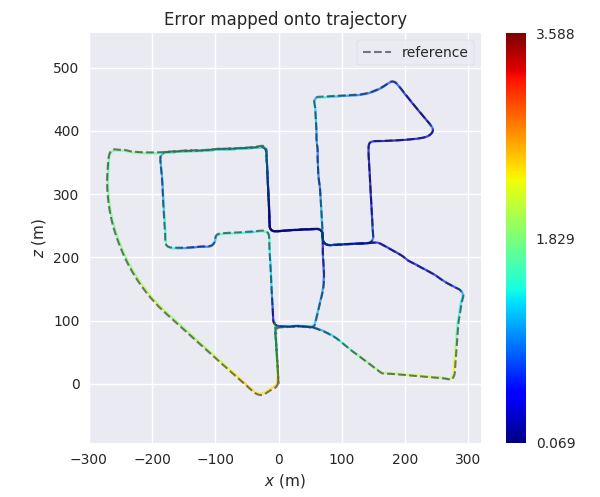
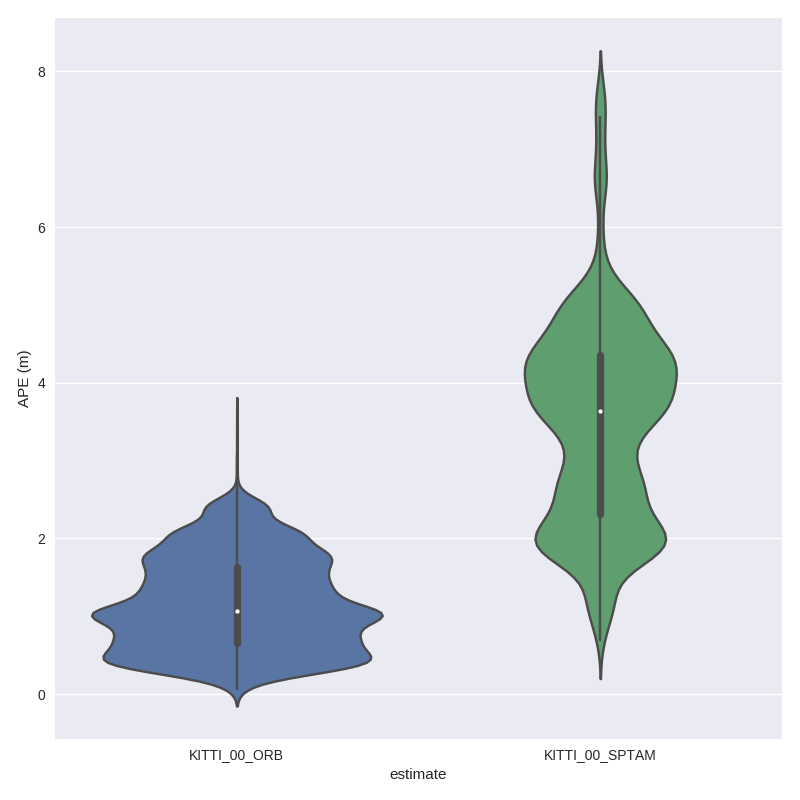
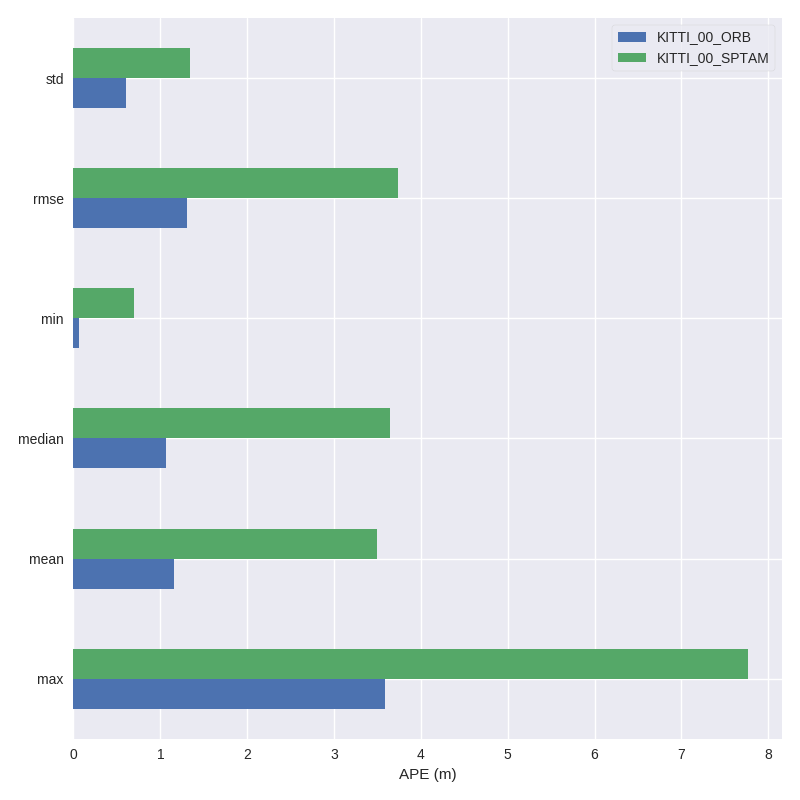
evo has several advantages over other public benchmarking tools:
- common tools for different formats
- algorithmic options for association, alignment, scale adjustment for monocular SLAM etc.
- flexible options for output, plotting or export (e.g. LaTeX plots or Excel tables)
- a powerful, configurable CLI that can cover many use cases
- modular
coreandtoolslibraries for custom extensions - faster than other established Python-based tools (see here)
What it's not: a 1-to-1 re-implementation of a particular evaluation protocol tailored to a specific dataset.
Installation is easy-peasy if you're familiar with this: https://xkcd.com/1987/#
Python 3.4+ and Python 2.7 are both supported. If you want to use the ROS bagfile interface, first check which Python version is used by your ROS installation and install accordingly. You might also want to use a virtual environment.
If you just want to use the executables of the latest release version, the easiest way is to run:
pip install evo --upgrade --no-binary evoThis will download the package and its dependencies from PyPi and install or upgrade them. Depending on your OS, you might be able to use pip2 or pip3 to specify the Python version you want. Tab completion for Bash terminals is supported via the argcomplete package on most UNIX systems - open a new shell after the installation to use it (without --no-binary evo the tab completion might not be installed properly). If you want, you can subscribe to new releases via https://libraries.io/pypi/evo.
Run this in the repository's base folder:
pip install . --upgrade --no-binary evoPython packages
evo has the following dependencies that are automatically resolved during installation:
numpy, matplotlib, scipy, pandas, seaborn, natsort, argcomplete, colorama, pygments, enum34 (only Python 2.7)
PyQt5 / PyQt4 (optional)
PyQt5 will give you the enhanced GUI for plot figures from the "Qt5Agg" matplotlib backend (otherwise: "TkAgg"). If PyQt5 is already installed when installing this package, it will be used as a default (see evo_config show). To change the plot backend afterwards, run evo_config set plot_backend Qt5Agg. PyQt4 can be set equivalently.
ROS (optional)
All ROS-related features like reading bagfiles require a ROS installation, see here. We tested this package with ROS Melodic, Kinetic and Indigo.
After installation with setup.py or from pip, the following executables can be called globally from your command-line:
Metrics:
evo_ape- absolute pose errorevo_rpe- relative pose error
Tools:
evo_traj- tool for analyzing, plotting or exporting one or more trajectoriesevo_res- tool for comparing one or multiple result files fromevo_apeorevo_rpeevo_fig- (experimental) tool for re-opening serialized plots (saved with--serialize_plot)evo_config- tool for global settings and config file manipulation
Call the commands with --help to see the options, e.g. evo_ape --help. Tab-completion of command line parameters is available on UNIX-like systems.
More documentation Check out the Wiki on GitHub.
There are some example trajectories in the source folder in test/data.
- Plot multiple trajectories
Here, we plot two KITTI pose files and the ground truth using evo_traj:
cd test/data
evo_traj kitti KITTI_00_ORB.txt KITTI_00_SPTAM.txt --ref=KITTI_00_gt.txt -p --plot_mode=xz
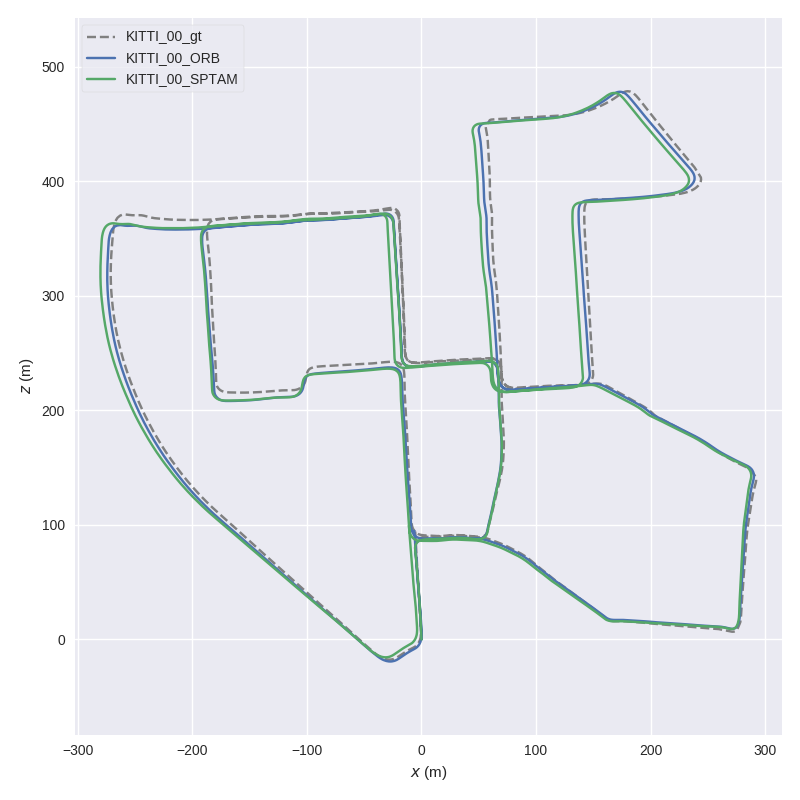
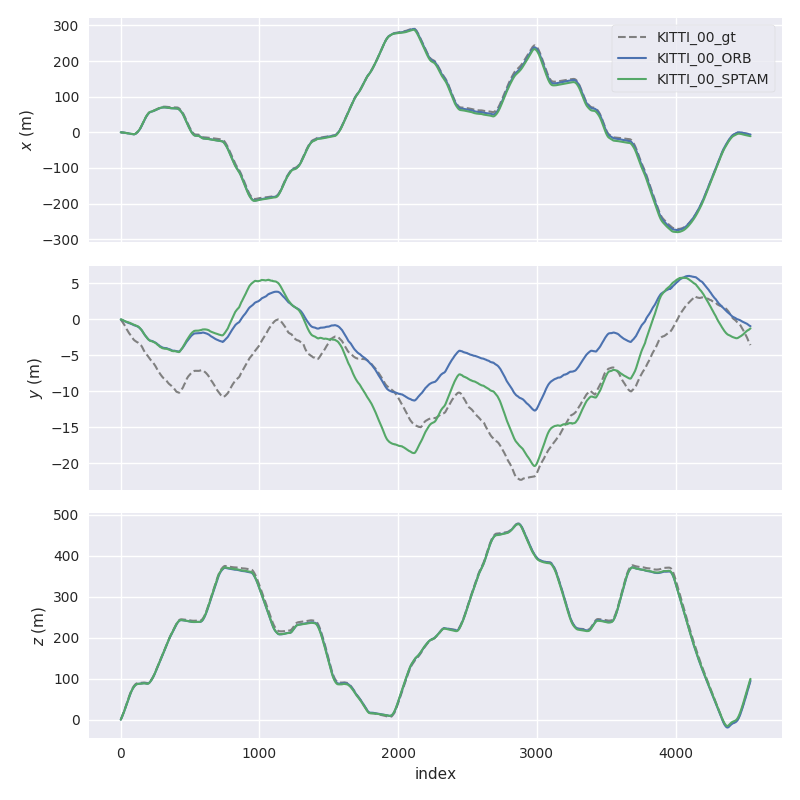
- Run a metric on trajectories
For example, here we calculate the absolute pose error for two trajectories from ORB-SLAM and S-PTAM using evo_ape (KITTI_00_gt.txt is the reference (ground truth)) and plot and save the individual results to .zip files for evo_res:
First trajectory (ORB Stereo):
mkdir results
evo_ape kitti KITTI_00_gt.txt KITTI_00_ORB.txt -va --plot --plot_mode xz --save_results results/ORB.zip
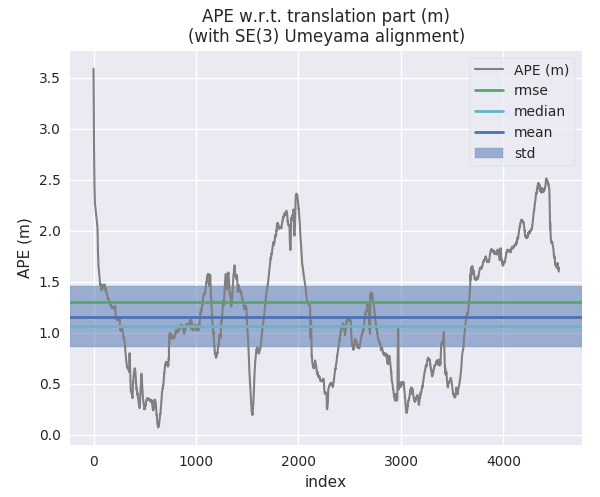

Second trajectory (S-PTAM):
evo_ape kitti KITTI_00_gt.txt KITTI_00_SPTAM.txt -va --plot --plot_mode xz --save_results results/SPTAM.zip
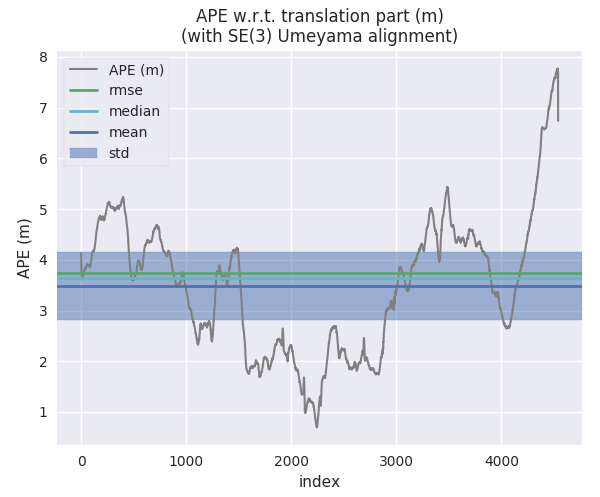
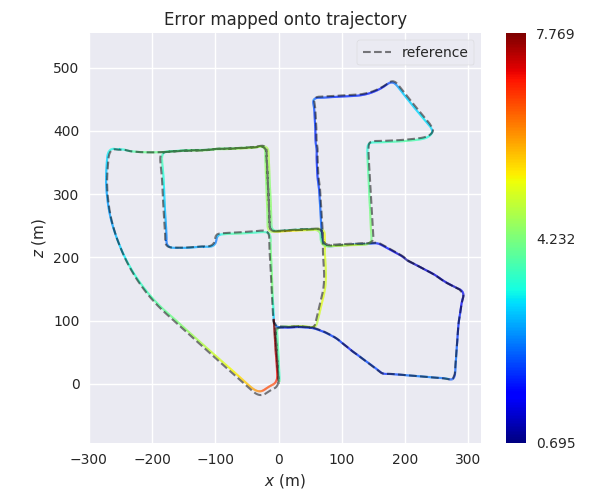
- Process multiple results from a metric
evo_res can be used to compare multiple result files from the metrics, i.e.:
- print infos and statistics (default)
- plot the results
- save the statistics in a table
Here, we use the results from above to generate a plot and a table:
evo_res results/*.zip -p --save_table results/table.csv
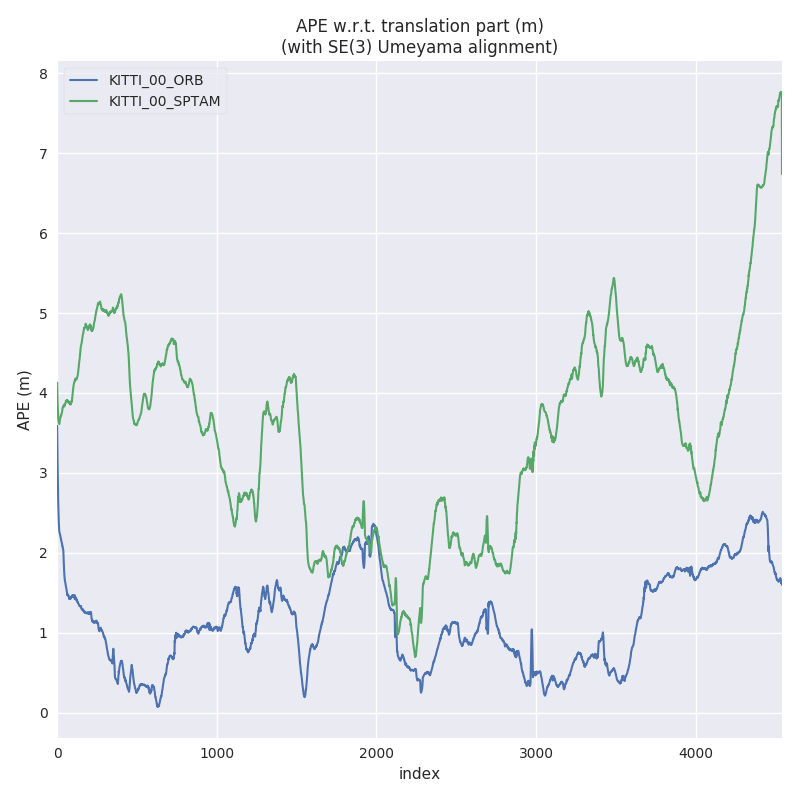
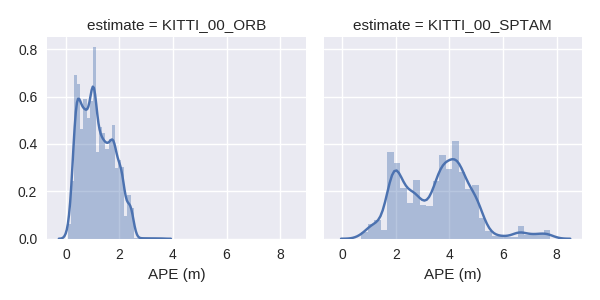

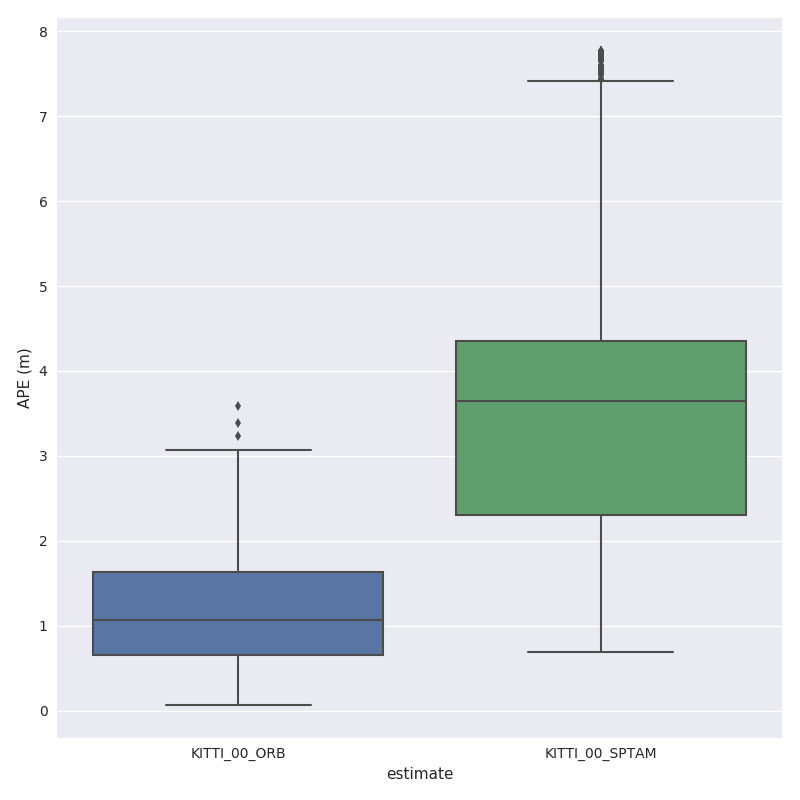

For an interactive source code documentation, open the Jupyter notebook metrics_tutorial.ipynb in the notebooks folder of the repository. More infos on Jupyter notebooks: see here
If you have IPython installed, you can launch an IPython shell with a custom evo profile with the command evo_ipython.
A few "inoffical" scripts for special use-cases are collected in the contrib/ directory of the repository. They are inofficial in the sense that they don't ship with the package distribution and thus aren't regularly tested in continuous integration.
":scream:, this piece of :shit: software doesn't do what I want!!1!1!!"
First aid:
- append
-h/--helpto your command - check the Wiki
- check the previous issues
- open a new issue
Jupyter notebook errors
No module named 'evo'
This can be caused if the Kernel version of Jupyter does not match the Python version of the evo installation.
Patches are welcome, preferably as pull requests.
If you use this package for your research, a footnote with the link to this repository is appreciated: github.com/MichaelGrupp/evo.